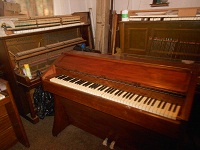 Founder of the famous piano company, Steinway & Sons, Henry E. Steinway (1797-1871) began his career in the kitchen of his house in the town of Seeson in Germany. In 1836 he built a grand piano that became known as the “kitchen piano”. Today it is on display in the New York Metropolitan Museum of Art.
Founder of the famous piano company, Steinway & Sons, Henry E. Steinway (1797-1871) began his career in the kitchen of his house in the town of Seeson in Germany. In 1836 he built a grand piano that became known as the “kitchen piano”. Today it is on display in the New York Metropolitan Museum of Art.If it’s good enough for Steinway, it’s good enough for Brian Lawson, whose kitchen has been given over to the reconstruction, restoration, and repair of pianos. In fact virtually the entire 7th Avenue house has been devoted to pianos since Brian moved in, in 1999.
He built a second story to make room for life without pianos but even then, there is only one chair in front of his computer. This is not a house for socialising or relaxing. It is a workshop.
After he finished school in Essex in the UK in the 1970s Brian, who says he grew up on the Beatles and prefers rock to classical music, went on the dole. His father was a trained classical pianist who eventually became a piano teacher in the local area. He persuaded Brian to register for a three year course in Piano Tuning, Repairs, Construction and Design at the London College of Furniture.
After working in the UK for a few years, Brian emigrated to South Africa in 1983 on contract with Kahn's Pianos. He went on to work for local piano retailer and then for 'The Music Shop' before setting up on his own in the Bez Valley house, which was previously owned by a fridge mechanic who used the front room - now crammed with pianos - as a night school for fridge mechanics.
 “It is a question of adeptness and patience as well as excitement and passion,” Brian says, demonstrating the intricate process of cutting and sticking identical strips of leather eighty-eight times for the eighty-eight keys of an average piano.
“It is a question of adeptness and patience as well as excitement and passion,” Brian says, demonstrating the intricate process of cutting and sticking identical strips of leather eighty-eight times for the eighty-eight keys of an average piano. Mice cause the most damage so five well-fed cats play an integral role in the life of the workshop.
Piano design has been dictated by fashion over the years, Brian says, pointing to an art deco piano. “A modern family in the 1930s and 1940s needed a small piano”.
Pianos today are even more streamlined and mostly imported from 12 or more Chinese manufacturers.Piano design has been dictated by fashion over the years, Brian says, pointing to an art deco piano. “A modern family in the 1930s and 1940s needed a small piano”.
 A piano's value hinges on the quality of the sound it makes rather than its antiquity, Brian stresses, comparing a piano made in the 1890’s to a more recent Broadwood.
A piano's value hinges on the quality of the sound it makes rather than its antiquity, Brian stresses, comparing a piano made in the 1890’s to a more recent Broadwood. Generally pianos are tuned once a year but pianos in recording studios are tuned every day and concert pianos after rehearsals and again an hour or so before a performance.
Generally pianos are tuned once a year but pianos in recording studios are tuned every day and concert pianos after rehearsals and again an hour or so before a performance.One of about 15 piano tuners in Gauteng, Brian leaves the more stressful work to others unless called upon to fill in when they are away, and avoids pressurised work if he can. "Why should I make somebody else's bad planning my emergency?" he says.
www.lawsonic.co.za

Excellent
ReplyDelete